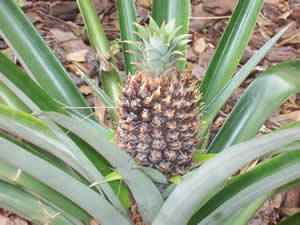My mental images of mankind’s original garden, alas, have been shaped by Sunday school curricula—coloring pages, flannel graphs, and children’s books. Still, I can’t help thinking the garden was more similar to the tropics of today than to the formal English gardens, all stiff upper-lip ornamentation and sundials. Adam and Eve may have left the garden, but the love of growing things remains strong in our collective consciousness.
of growing things remains strong in our collective consciousness.
As optimistic but unskilled gardeners, my husband and I have seen quite a few plants come and go over the years here in South Florida. During the worst drought, we lost a rather nice vegetable plot and haven’t had the heart to try one again, except for the tomatoes we grew in an EarthBox. (It was a bumper crop, which was enjoyed by insects who had weapon, motive, and opportunity.)
No, our greatest success has been with epiphytes. These can grow on trees (Spanish moss, orchids, or staghorn ferns) or in the air like orchids or staghorn ferns or on the ground like pineapples. These kinds of plants require little from us—“they toil not, neither do they spin” (Matt. 6:28, KJV). The rose bush, however, rebounded only after a near-death pruning.
We’ve attended our current church long enough to see a number of people come and go, too. Some don’t require much care, obtaining their spiritual sustenance without apparent effort, like airplants. Others, who are needier, smother their caregivers in a way reminiscent of kudzu (an invasive alien plant that kills trees upon which it grows). Then there are those who thrive under heavy pruning (“every branch that beareth fruit, he purgeth it”—John 15:2), constant watering (“the washing of water by the word”—Eph. 5:26), staking, or propping up (“support the weak”—1 Thess. 5:14).
What about those times when growth is imperceptible, whether in ourselves or in others? Could it be that the dry times are forcing roots deep and that the eventual fruition will be all the richer? Or are we letting the “cares of this world,” weedlike, choke us?
One can force a bulb to flower before spring arrives. The process involves darkness and refrigeration and takes the strength from a bulb while allowing it to bloom early just the one time. When I force issues with someone who is not ready, is it possible that I can discourage that person and run ahead of the Holy Spirit’s quiet working? Only God knows exactly how much light, water, and pruning are required in order to produce fruit.
C.S. Lewis’ newly created Narnia, as depicted in The Magician’s Nephew, had soil so rich that anything planted grew to fruition in a matter of hours. Perhaps the Garden of Eden was similar. But here on earth “the whole creation groaneth and travaileth in pain together until now” (Rom. 8:22). I’ve read my growing instructions, and they are simple: “I am the vine, ye are the branches: He that abideth in me, and I in him, the same bringeth forth much fruit: for without me ye can do nothing” (John 15:5).
Someday, we will see a new heaven and a new earth, perfection only hinted at in our cursed cosmos. And “when he shall appear, we shall be like him; for we shall see him as he is” (1 John 3:2).
 Beth Murschell is married to Mick, a computer programmer, and they live in Bradenton, Florida. Her master’s degree is in music education, but her past work experience includes industrial cleaning, childcare, bumper factory, fast food, camp work (three different camps), music team, telemarketer, media center, music educator, sixth-grade teacher, maid, retail, writer, and now mother of four. She has lived in
Beth Murschell is married to Mick, a computer programmer, and they live in Bradenton, Florida. Her master’s degree is in music education, but her past work experience includes industrial cleaning, childcare, bumper factory, fast food, camp work (three different camps), music team, telemarketer, media center, music educator, sixth-grade teacher, maid, retail, writer, and now mother of four. She has lived in
No comments:
Post a Comment